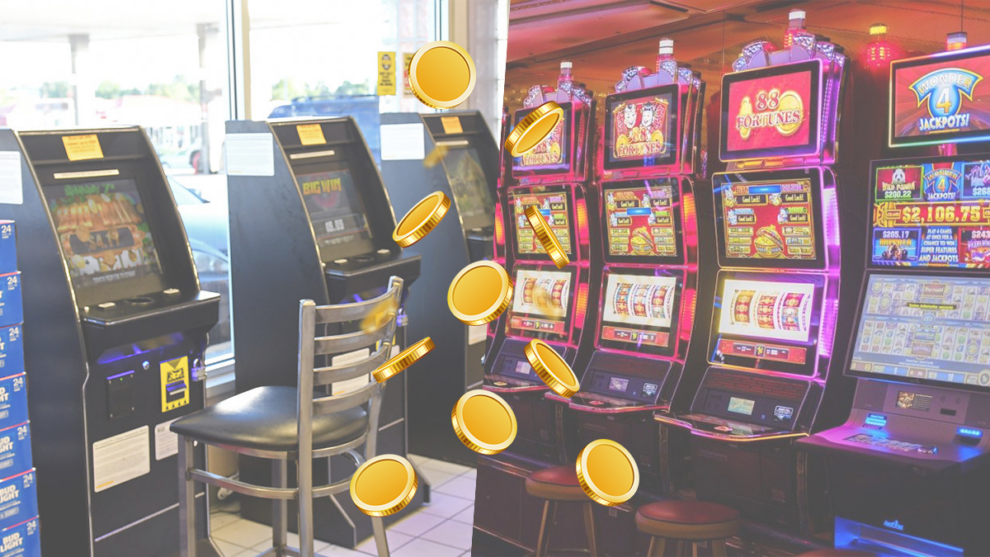In recent times, slot machines in gas stationsand convenience stores have rapidly expanded across several states, occupying a legal gray area between entertainment attractions and unlawful gambling. The proliferation of gas station slots stems from the convergence of evolving gaming tech, shifting societal perspectives, and conflicting state regulations trying to balance economic incentives with ethical concerns.
This article investigates the business models and legal debates surrounding gas station slot machines as they continue spreading despite growing public and government scrutiny. But first.. aren’t online slots better to play than gas station slots?
Real Money Online Slots vs Gas Station Slots
When it comes to slot machines, more and more players are opting to spin the reels online rather than at their local gas station. Online slots offer some clear advantages over the machines found at petrol pumps and convenience stores.
For one, the variety of online slots is far greater. At gas stations, you might find a bank of 5 or 10 slots with mostly repetitive game themes and features. But online casinos can offer hundreds of unique slot titles spanning different genres, bonuses, payline configurations, and more. This keeps gameplay fresh and exciting.
Online slots also tend to have higher return-to-player (RTP) percentages. This means more money inserted into these games remains with the player over time instead of just going to the casino. Gas station slots infamously have very low RTPs.
In addition, online play provides convenience unmatched by gas station machines. Players can access real money slots instantly on their computer, phone, or tablet at home. No driving across town to play for just a short while is necessary.
While some enjoy the nostalgic, old-school vibe of gas station slots, their limitations have more players migrating to online casinos for slot play these days. The vastly expanded selection and higher rewards make online the preferred choice.
Types and Geographic Footprints
Gas station slot machines, also termed convenience store slots or truck stop slots, have become increasingly ubiquitous across particular states recently. These devices allow patrons to play electronic slots and other games of chance while filling up or buying snacks.
Regulated vs Unregulated Markets
The types of machines found in gas stations differ by jurisdiction. In more regulated markets like Nevada, Louisiana, West Virginia, and Illinois, you may encounter actual licensed video gaming terminals (VGTs) closely resembling slots in casinos. These VGTs connect to a central monitoring system overseen by the state’s gaming commission. Mandatory payout percentages and randomness testing apply.
For instance, Nevada currently hosts over 600 regulated gas station and bar VGT units. Louisiana has deployed nearly 3,000 truck stop VGTs since 2018, generating substantial tax receipts. West Virginia also utilizes centralized VGTs governed by the state lottery commission.
Conversely, other states like Pennsylvania, Texas, Georgia, Florida, and Kentucky have seen a surge of unregulated “skill games” in gas stations and convenience stores. These machines exploit gambling law loopholes by incorporating minor skill elements like memory challenges, shooting tasks, or selecting the correct sequence. However, the skill component barely influences my overall odds.
Major Manufacturers and Analytics
Major manufacturers like Pace-O-Matic and Banilla Games provide their skill games to tens of thousands of locations in collaboration with gas station owners. These devices do not publish payout percentages publicly. There is also no oversight on whether games manipulate payouts over time to increase profitability.
Numerous new gas station slots implement advanced player tracking capabilities. Using loyalty cards, the machines can identify frequent customers like myself and distribute targeted promotions. Back-end analytics deliver operators valuable intelligence on usage patterns and revenue. Systems like QuickJackpot enable real-time prize redemption.
Substantial Revenue Potential
Despite the lack of regulation in most areas, convenience store slots offer tremendous moneymaking potential for gas station proprietors. Insider projections suggest the domestic slot machine market alone could reach $9.5 billion annually and rising. This incoming windfall precipitates rapid expansion in states where enforcement remains lax.
However, the legal environment persists as ambiguous at best in unregulated markets. Let’s examine some of the complexities currently facing gas station slot purveyors across different states.
Current Legal Landscape and Challenges
The lawful status of gas station slot machines hinges on differentiating games of skill and games of chance. Casino slots and table games clearly constitute chance-based gambling. At the other end, arcade amusements like skeeball requiring physical prowess are legal.
Gas station slots exist in an ill-defined gray zone that varies across jurisdictions. States like Utah and Hawaii ban all forms of gambling, while others like Nevada and West Virginia allow strictly regulated VGTs. Meanwhile, states like Texas and Georgia struggle to categorize pseudo-skill machines.
Differing State Policy Approaches
In Texas, slots are only permissible in licensed casinos. However, skill games have spread rapidly by circumventing loopholes in the criminal code. Nearly 40 counties now outlaw game rooms hosting eight-liners. But elsewhere, law enforcement only targets secondary illegal activities at the locations rather than the machines themselves.
Georgia state law allows “bona fide coin operated amusement devices” awarding non-cash prizes. However, the Georgia Lottery seeks to govern skill games under its authority. In 2021, the Georgia Supreme Court prohibited convenience store gaming devices for violating statutes, resulting in confiscations. Yet legal disputes continue simmering.
Pennsylvania has witnessed aggressive efforts to crack down on unregulated skill games in gas stations and small companies. Since 2020, the state police and liquor control board have seized thousands of terminals, although several district attorneys dismissed criminal charges. Skill game manufacturers persist in finding and exploiting legal workarounds.
Debating Skill vs. Chance Classification
The ongoing litigation and legislation reveals disagreement around whether these games constitute skill or chance. Do I truly influence the outcome through ability, or is the skill element an illusion masking unregulated gambling? Scientific testing of the machines could determine the degree of player control. But legally judging precedent from before modern slot advancement proves complex.
Presently, the sophisticated analytics and features in gas station slots flourish unchecked by oversight or sanction. Operators continue opening new locations while legislative and judicial processes slowly grind. Both camps seem entrenched for protracted clashes.
Business Models and Economic Impact
While the lawful standing remains ambiguous, gas station slot machines yield tremendous profits for convenience store proprietors. Existing lottery sales entice foot traffic and conversions toincidental purchases. Slots constitute another entertaining diversion keeping patrons on-site longer while also attracting new visitors altogether.
Mutually Beneficial Arrangements
In fact, major convenience chains proactively court entrepreneurs to establish slot routes where both parties share slot revenue. Stores enjoy fresh income with minimal capital outlays. Route operators handle acquiring terminals, licensing, maintenance, and payouts.
Leading gas station slot manufacturers like Pace-O-Matic and Banilla Games market their products as guaranteed moneymakers. They reference statistics like a 349% spike in average shopping basket sizes from Oklahoma patrons who played slots in 2021. Loyalty programs also boost repeat business.
Economic Debate Points
The Georgia Amusement and Music Operators Association claimed its unregulated skill games generate around $4 billion in yearly economic impact statewide. The industry employs 7,000 workers who would lose jobs if banned. These small business arguments carry influence with some lawmakers.
However, without oversight, state governments also forfeit millions in uncollected tax revenue. A 2020 Georgia legislative audit estimated $560 million in untaxed annual slot proceeds. Pennsylvania skill games detract from official gaming taxes. Unchecked slots also undermine newly authorized casino sectors in some states.
Weighing Costs Against Benefits
Full-scale prohibition could negatively impact route owners, manufacturers, gas station proprietors, and affiliated vendors. But absent regulation denies states their rightful public share while enabling gambling proliferation. There are also concerns around addiction and underage access with conveniently located machines.
Essentially, the economic impacts require balanced cost-benefit analyses. Additional tax income could fund programs offsetting gambling risks. Under proper supervision, gas station slots can yield small business revenues without cannibalizing licensed gaming profits. Reasonable arguments exist on both sides, but potential tax hauls influence current policy debates.
Future Outlook and Industry Adaptations
Looking ahead, the trajectory for gas station slot machines faces greater uncertainty as legal challenges accumulate. High-profile bans in jurisdictions like California plus intensifying crackdowns in Pennsylvania exemplify pushback against unchecked gambling expansion.
Responsive Business Strategies
However, the industry retains enough financial and political clout to avoid outright prohibition in most states. Manufacturers like Pace-O-Matic trumpet small business advantages and willingness to pay taxes, aiming to avoid bans while still limiting regulation.
Some jurisdictions may follow Louisiana’s model and regulate convenience store slots under lottery or gaming commissions. Imposing fair taxation could dampen many legal concerns. This would still allow merchants to capitalize on the machines’ revenue potential within a governed framework.
But increased oversight carries drawbacks for the industry too. Red tape, payout audits, age limits, and fees all erode profits. Any regulation threatens the current model where route operators deal directly with locations rather than centralized agencies. The industry wants vindication but minimal obstacles.
Ongoing Negotiations
This push-pull between regulators, legislators, and business stakeholders seems likely to unfold over coming years. The industry can nimbly exploit the next loophole as current ones close. Their influence prevents outright bans.
Optimally, balanced solutions could allow regulated slots that provide economic benefits while upholding ethical safeguards against exploitation. But principled compromise remains tricky. For now, the spread continues while states slowly coalesce their responses.
Conclusion
In summary, gas station slot machines occupy a complex niche between entertainment attractions and unauthorized gambling. Their lawful status depends on archaic definitions predating modern machines.
Available evidence suggests convenience store slots generate substantial small business earnings while potentially enabling addiction and unconstrained gambling access. Jurisdictions struggle to balance financial incentives against social risks.
Total prohibition appears doubtful given the industry’s adaptive nature. But calls for increased oversight and taxation will amplify as unauthorized gambling grows. The path forward may involve crafting nuanced regulations allowing controlled expansion.
There are compelling cases both for and against gas station slots. But blanket bans could do more damage by eliminating legal income streams. With ethical limitations and competent enforcement, gas station slots can create jobs and tax revenue under responsible management. However unchecked spread enables gambling’s societal dangers.
Overall, gas station slot machines encapsulate broader dialogues around modernizing gaming laws and society’s relationship with gambling itself. Their future depends on whether opposing viewpoints can adopt ethical, balanced middle-ground policies. The complex balancing act continues, but solutions upholding public interests remain viable through reasoned reforms.
Source: Nubia Magazine










